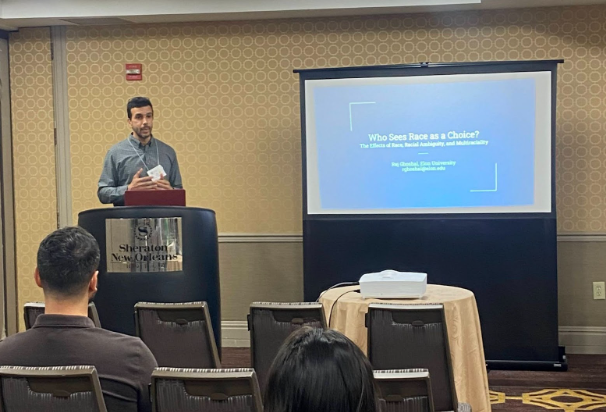Sociology faculty Rena Zito and Raj Ghoshal presented research at the annual meeting of the Southern Sociological Society in New Orleans
Two faculty members in the Department of Sociology and Anthropology presented research at the annual Southern Sociological Society conference in New Orleans, Louisiana, from April 4 through April 6.
Rena Zito, associate professor of sociology at Elon University, presented on the effects of offense type and applicant race on college students’ attitudes towards college applicants with felony records. Zito co-authored the research with Stacy De Coster, professor of sociology at North Carolina State University.
Zito’s presentation focused on respondents’ qualitative responses to open-ended questions about why universities should or should not restrict access to applicants with felony histories. While the quantitative results from the survey-based experiment indicated that offense type, but not applicant race, influenced attitudes towards the social exclusion of applicants with criminal records, the qualitative results evidenced nuanced racialized language in how respondents responded to the applicants. For example, respondents were more likely to emphasize academic merit and a holistic approach for white applicants than Black applicants. In addition, they cite possible harm to the reputation of the university when considering Black applicants with violent records, but not when considering a white applicant with the same record. The presentation was part of a session titled “Recidivism and Barriers to Reentry” for which Zito was the presider.
Associate Professor of Sociology Raj Ghoshal organized and presided over two sessions on Racial Conceptualization and Racial Attitudes. He also presented research that addresses how much importance Americans give to self-identification when thinking about what race other people “really” are.
Ghoshal argued that theories of colorblind racism imply that white Americans would be especially likely, and Black Americans especially unlikely, to think that race is “up to each person,” while theories of old-fashioned racism imply the opposite. Ghoshal tested these theories using an original nationally representative survey of over 1,000 Americans and found that neither holds. Instead, results showed that multiracial people, racially ambiguous people, Hispanic Americans, and “contested whites” are more supportive of racial voluntarism than either white-only or Black-only Americans. He argued that findings support theories rooted in identity threat and contestation and call into question some popular claims about people of color’s views of racial identity.



